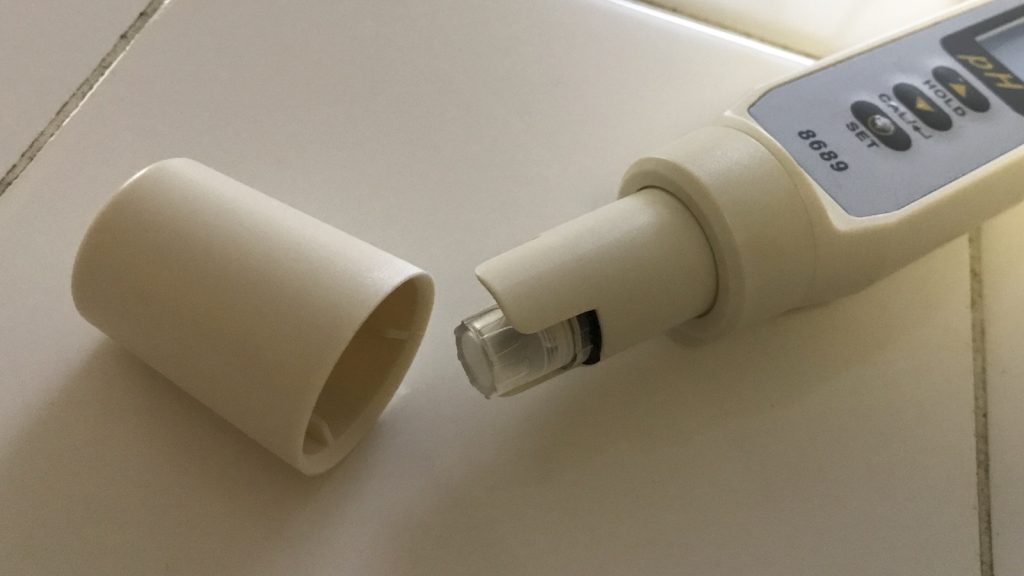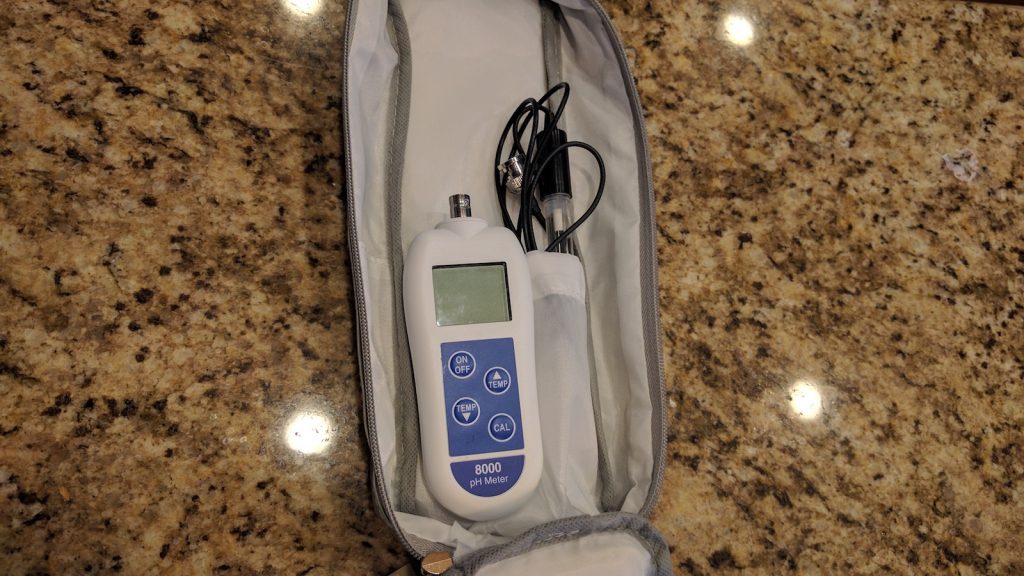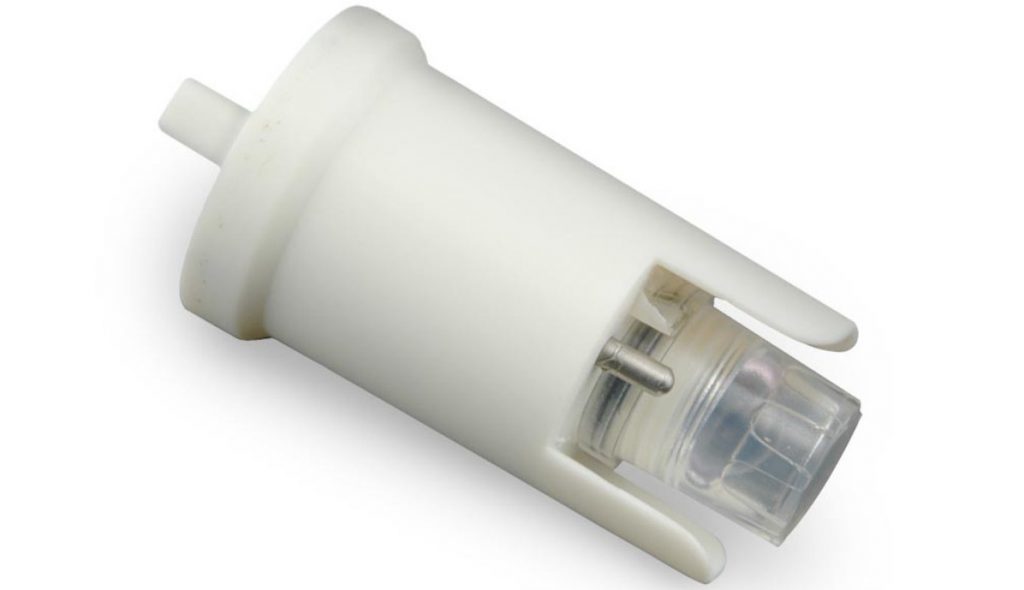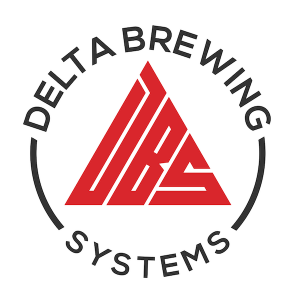Authors: Matt Del Fiacco & Marshall Schott
Since starting the xBmt series over 3 years ago, we’ve tested a multitude of brewing variables believed to have a major impact yet results have been inconclusive. One thing this has not been the case for is the variable of water chemistry with most xBmts returning statistically significant results, suggesting the water we use to make our beer does matter, perhaps more than many once presumed. That’s certainly true for most of us here at Brülosophy who used to view water as an issue of last focus yet now believe it is of primary importance!
There are a few major components when it comes to precisely dialing in one’s water to a desired profile, namely mineral content and acidity, the latter of which requires some form of measurement tool to ensure the proper pH has been reached. While pH strips are cheap and relatively easy to use, they aren’t necessarily known for being very accurate, forcing brewers to rely on a change in color on litmus paper to indicate a range within which the wort pH lies. A popular alternative for those preferring more accuracy is the digital pH meter, which allows brewers to quickly and easily measure wort acidity by dipping a probe into a small sample then reading a LCD display.
There exist numerous versions of pH meters on the market, ranging from cheap and unreliable to very expensive with pin-point accuracy. The focus of this review is on a couple relatively new pH meters by ThermoWorks, known for their super fast and accurate ThermaPen thermometers. Having messed around with various approaches to pH measurement, we were excited to see how the ThermoWorks pH meters stacked up.
The product/s reviewed for this article was provided by the manufacturer in exchange for an honest review; no other compensation was provided. The opinions expressed in the article are solely those of the author/s and a concerted effort was made to approach the review from an unbiased perspective.
This review is a collaborative effort between Matt and Marshall who have been using ThermoWorks models 8000 and 8689 pH meters, respectively, for the last few months. Rather than splitting them up into separate reviews, we thought it’d be helpful to compare them side-by-side. For that reason, each meter is reviewed independently on the same criteria.
Build quality
8000 (Matt): I’ve gotta say, the build quality is one of my favorite things about this pH meter. The plastic it’s made from is sturdy and solid, and there is a weight to it that is comforting as someone who is regularly not trusted with fragile items. The four buttons that make up the actionable section of the interface drop down enough to reassure you that you did indeed make a selection, and the LCD display is clear and responsive. I don’t have the rubber case currently, but I plan on getting it soon. The probe is connected via a disconnect at the top of the unit, which is capable of quickly being attached/detached. The probe is made of strong plastic with the replaceable glass electrode protected by the shell. No need to worry about tipping over a small sample of the wort, I’m sure this relatively lightweight meter would hold up just fine.
8689 (Marshall): I was a little surprised after opening the box for the 8689 pH meter, for some reason I expected it to be a little heavier than it was, perhaps because I’d been using the relatively weighty Milwaukee MW-102 for the last couple years. Any concerns I had up front about build quality have since been quelled, as I’ve treated the meter no differently than any of my other gear, even dropped it fairly hard on my workbench once, and it is still in tip-top shape. The LCD screen is easy to read, the buttons do exactly what they’re supposed to, and the plastic is sturdy despite the lacking weight. The meter comes with a screw on electrode cover that I keep filled with storage solution in order to prolong its life.
Read Speed and Stability
8000 (Matt): The read time on my ThermoWorks 8000 is very quick, taking about 10 seconds to establish a stable pH reading, a far cry from my old Etekcity meter that would take 30+ seconds and never fully stabilize. In addition to being quick, the readings are consistent over multiple measurements, which is exactly what I want in a pH meter.
8686 (Marshall): My first pH meter was a yellow cheapy that worked for a few months before crapping out on me, and even before it broke, it was slow and inconsistent. When I upgraded to the MW-102, consistency definitely improved, but it still took a good 15-20 seconds for the pH reading to stabilize. Unexpectedly, the ThermoWorks 8689 meter produces a stable reading in about 8-12 seconds, which isn’t a huge time savings, but anything that hastens my brew day is convenient. Over multiple readings of various solutions, the 8689 was consistently within 0.01 pH, which is good enough for me.
Calibration & Accuracy
8000 (Matt): Relying on the provided instructions, I calibrated the 8000 prior to first use using calibration solutions, it was incredibly simple and only took a couple minutes. The ability to calibrate without the use of a small screwdriver is definitely a welcome benefit of this meter, and I appreciate that the 8000 can be manually adjusted for solution temperature as well (the 8100 includes a temperature probe for auto-adjustment). While ThermoWorks recommends calibrating the meter before each use, I haven’t really needed to do so since it has consistently read within 0.01 of my intended pH as calculated by the Bru’n Water Spreadsheet over 12 batches.
8689 (Marshall): Calibrating a pH meter is an annoying though necessary step for those who prefer accurate readings. My MW-102 required calibration prior to every brew day, often reading around 0.5 pH off of calibration solutions after a week or 2 of no use. A surprisingly pleasant experience with the 8689 is how it seems to maintain calibration. I check accuracy using calibration solutions prior to every batch I make to determine whether calibration is necessary and without fail, the 8689 has yet to fall outside of a 0.01 pH range of 4.0 and 7.0 pH calibration solutions. Additionally, my mash pH readings are always within 0.1 of what the Bru’n Water Spreadsheet predicts given my starting water profile. Finally, the 8689 has built-in automatic temperature compensation, which is a nice feature in such an affordable meter.
Ease Of Use
8000 (Matt): Once calibrated, use is the easiest thing in the world. Turn it on, place the probe into a small sample of wort (or whatever other solution), and give it 10-15 seconds before making note of the pH. The only challenging thing about the unit is the interface, which is not incredibly intuitive. There are a fair degree of acronyms used in the settings, long button presses that perform certain functions, and unclear directional commands. The instructions are incredibly valuable here and it’s pretty easy to gain a solid understanding of how to use the system, but there is a slight initial learning curve.
8689 (Marshall): My favorite thing about the 8689 has to be how easy it is to use. After using a meter that had 2 probes with long wires connected to a larger base unit for the last couple years, being able to simply remove a cover, press a button, and plop the entire meter in a sample was incredibly appealing to me. Like with any electronic device, there is some learning involved in order to use it correctly, but it’s nothing that can’t be easily accomplished by reading the relatively short instruction manual. After using the pen-shaped 8689, I can’t ever see myself going back to clunkier meters.
Storage
8000 (Matt): The 8000 comes with an electrode cap that holds storage solution as well as a nice case to keep the unit safe between brews. The case has a pocket for those who prefer to disconnect and safely tuck away the probe. The unit itself isn’t too big, but it does have a larger footprint than other other pH meters I’ve seen, so storage space should be considered when looking to purchase this unit.
8689 (Marshall): The simple and sleek design of the 8689 makes it super easy to store, taking up a tiny amount of space with no cords to get tangled. I really appreciate this!
Probe Replacement
Unfortunately, electrodes don’t last forever, though their life can certainly be prolonged with proper storage. Thankfully, ThermoWorks offers replacement electrodes for both the 8000 and 8689 pH meters so that users don’t have to buy a brand new unit when things go south.
Seriously though, use storage solution, it’s there for a reason.
| THE VERDICT |
The ThermoWorks 8000 pH meter is a quality piece of equipment that does everything it is expected to do quite well– it’s durable, fast, consistent, and accurate. Curiously, the specs of the 8000 are remarkably similar to those of the 8689, and based on our combined experiences with both, they seem to share a similar performance. With this in mind, and since the 8689 is regularly priced $44 lower than the 8000, it’s difficult to strongly recommend the 8000 over the 8689. That said, for those who prefer a larger base unit with a corded probe, the 8000 will undoubtedly fit the bill, and either meter will help you precisely dial in your water profile to make your beer better!
For a limited time, the ThermoWorks 8689 is on sale for only $69,
get yours now before the price goes back up!
Support Brülosophy In Style!
All designs are available in various colors and sizes on Amazon!
Follow Brülosophy on:
FACEBOOK | TWITTER | INSTAGRAM
If you enjoy this stuff and feel compelled to support Brulosophy.com, please check out the Support Us page for details on how you can very easily do so. Thanks!



















34 thoughts on “Product Review | ThermoWorks High Precision pH Meters”
Just a bit of information: pH probes start to drift as they age. The signal that the meter correlates to a given pH reading is in milliamps, so it won’t take much to throw off your accuracy. It is also imperative that you store the probe submerged in storage solution! Some great information on pH meters, how they work and how to care for them can be found here: http://www.mbhes.com/ph_meter_guide_care_and_calibration.htm
They did mention using storage solution, but all good info. I have been using 4.01 buffer calibration solution as my storage solution for years. The disclaimer is it’s probably best to use what the manufacturer recommends, but that’s my experience.
If Bru’n Water is so accurate, why not just trust it and save the money on this? I’ve always been confused on what you are supposed to do if your pH is off 15 minutes into the mash anyway. I thought most if not all conversion is done really quickly. So it seems that it would be too late to adjust to make any difference. Thoughts?
Are pH meters totally necessary? Probably not, particularly if you always us RO or distilled water. I don’t and my municipal water sources changes a couple times per year, plus I really like confirmation that I hit my targets.
I asked the exact question about adjusting during the mash a while back on Homebrewtalk, the “answers” can be found at http://www.homebrewtalk.com/showthread.php?t=547192.
I still don’t really know what’s right or wrong but I do use Bru’n Water to hit my target pH as soon as possible. I used to check the pH of the mash 10 minutes in then adjust with phosphoric acid. I haven’t noticed a difference but I never did a side by side either.
You can adjust your pH if it’s off by more than you’d prefer. Take a measurement, make small adjustment with an acid, measure again. The pH is not only a concern during the enzymatic mash period.
The pH of the wort carries through the entire process right down to the final product. Sure, the process is robust, and there is some modulation due to buffers and the yeast, but pH effects tannin extraction, protein polyphenol coagulation and precipitation, color pick up, rate of oxidation, flavor and mouthfeel, rate of hop utilization, flavor and microbial stability and more.
I agree that adjusting pH mid-mash is going to be difficult and will be difficult to reproduce or understand the impact.
My argument for the pH meter is that tools like Brun’ Water can’t accurately represent all malt bills. Anytime I change a recipe I check pH and I’ve seen significant variations from things like changing between Best and Avangard Munich malts (same Lovibond).
That’s a good point about the speed of conversion. If your mash pH is off there’s not much you can do about that batch but it will allow you to make adjustments to subsequent batches. If there is a consistent problem in your brewing process, a pH meter can help you find it and address it.
pH meters also become more useful when brewing sour beers. To measure pH change due to lactic acid production for example.
I create water profiles starting with RO water using the Bru’n Water spreadsheet. From what I’ve read on here that should usually provide an accurate ph. If I get a Ph meter and find that I’m off target, is there something I can do on brew day or should I just compensate the next time I make that recipe?
Sure, you can use an acid to quickly reduce the pH, I prefer lactic, or an alkaline like pickling lime to quickly raise it. If you start with RO, your predictions ought to be pretty close to accurate.
I mainly capture pH reading collected during the mash for use in the future. I do use Bru’n water and usually get pretty close with my tap water but occasionally will get a surprise. If I see the mash above 5.5 I will acidify sparge water and higher than that I suppose I’d add acid to the mash.
Like the authors my first pH meter was unreliable and broke quickly. Thanks for reviewing these. I used colorphast pH strips for years, then decided to give a meter another try. So I bought a Hach Pocket Pro +. https://www.hach.com/pocket-pro-ph-tester-with-replaceable-sensor/product?id=17990686211&source=googleshopping&locale=en-US&_bt=193103090537&_bk=&_bm=&_bn=g&gclid=CLTE3Z-u49QCFUuUfgodKvAI_g
Unlike most other meters it dose NOT require a storage solution. It readings stabilize within 30 seconds. It calibrates very easily and the only issue I have had is when I did not use the 10.01 calibration and only the 4 and 7 the calibration icon come on although the mash reading still accurate. The 10.01 is required for an accurate reading of any solution over 7. Recently I turned it on after 2 weeks of no use and it was still in calibration. It more expensive but all I can say is 20 batches and six months of use and no problems.
There is no need to get a pH meter for standard brewing – it’s like conducting an iodine test (testing is just a waste of time and money- as long as you know what you’re doing (and use tools like bru’n water), pH and conversion are gonna be fine). But once you get into sour beer, pH meters are extremely helpful for monitoring sourness. They instantly sold out of the 8689 after this post came out- can’t wait for mine to ship in August!
A pH meter only tells part of the story when it comes to sourness. TA probably has a truer correlation.
My opinion is, depending on what you wish to monitor and measures, a pH meter’s importance can vary.
I wanted to learn about water vs just plugging numbers in. I wanted to both taste and see various minerals and acids impact.
That’s not important to some or even necessary to make good beer.
Marshall, what storage solution do you use? And thanks for another great review.
Whoops! Forgot to add the image of it prior to publishing, just fixed that in the article. I use this stuff: http://amzn.to/2slGXHl
The 4.01 calibration solution works fine as a storage solution.
Thanks for the review. I placed an order for the 8689 and am looking forward to playing with it.
Bit of a bugger for us nz’ers, shipping puts it out of reach. Looks like exactly what I’m after as well. The search continues
The customer care from Thermoworks is tops. Online chat with them is available for instant response to questions.
Marshall, I’m laughing at your review–you’ve drawn exactly the same reactions to the MW 102 as I have. I had some paypal money so I decided to get the 8689. I’m sure I’ll like going cordless as much as you have.
How do you store the 8689 probe in storage solution?
It comes with a small cap over the electrode that holds a small amount of solution. Super easy.
I bought those pH standards on amazon (which are not NIST traceable) and they were WAY off! like 3.8 and 7.3! Please don’t endorse those, if I didn’t have a backup meter to borrow from work and figure this out I would have been making beer with way-off-target mash pH values for a while!
You can see many others found the same thing if you read the one-star rated reviews on amazon.
Save us all some time and heartache and find a good product before linking it please.
The link says NIST traceable. So has anyone contact the mfr about this? maybe your work meter was off. Did you compare calibration of other standard solutions to prove this? I used those first then bought these https://www.amazon.com/gp/product/B01LVVAKEM/ref=oh_aui_detailpage_o07_s00?ie=UTF8&psc=1.
Again I find it very advantageous to NOT need a storage solution with my Hach Pocket Pro +and have found others very happy> I have nothing against the ones reviewed here nor do I have any affiliation with Hach, but feel the Hach meter is a superior meter to either and is in between the price of the two reviewed.
EIther way I think brewing with a meter has improved my beers and understanding of mashing. Cheers!
My 8689 is brand new takes FOREVER to stabilize on a reading. Well over a minute. Could it have a bad electrode?
Have you calibrated?
Hi! Yes I calibrate before every use. Thermoworks recommended soaking the electrode in tap water for 10-15 minutes then rinsing in distilled water. It seemed to help a bit but the meter still seems slow.
The spec sheet on the 8689 says the temp range only supports up to 122 degrees F. No issues using this in mash > 150 degrees?
Yo! I always chill the sample to ~68F/20C before taking the pH measurement.
I have no idea how you were able to calibrate the 8689 so quickly. We did a bulk buy with our HB Club and none of us are able to calibrate it in under 2 minutes. A lot of the units are now failing (not the probe, the main unit) and it’s only been 14 months. I would definitely not recommend this unit at all especially considering how terrible the support was from Thermoworks. We have since been recommending the Milwaukee pH56 to our members.
Yikes, that sounds terrible. I was going to suggest contacting ThermoWorks to see if they may have produced a bad lot, but it sounds like perhaps you’ve already attempted to do that. My unit worked flawlessly for many, many batches, and while I sort of stopped caring about mash pH due to our xBmts on the subject, I recently used my 8689 to check pH when kettle souring and it worked totally fine.
I’m really sorry for your experience and will bring this up with my contact from ThermoWorks. At the very least, I’d think they’d offer to refund you for the non-working units.
First I have no affiliation with Hach. If you are looking to replace your meter I strongly suggest the Hach pocket pro which has the replaceable electrode. I have had mine for about three years now with no issue. It has a 3 point cal program built in so I use 4,7, and 10 buffer. While 4 to 7 is enough I still prefer to be able to check my water.
If the manufacturers specified precision of the instrument itself is +/- 0.05, how does it manage to consistently get you within 0.01 of your chosen softwares mash pH predictions?